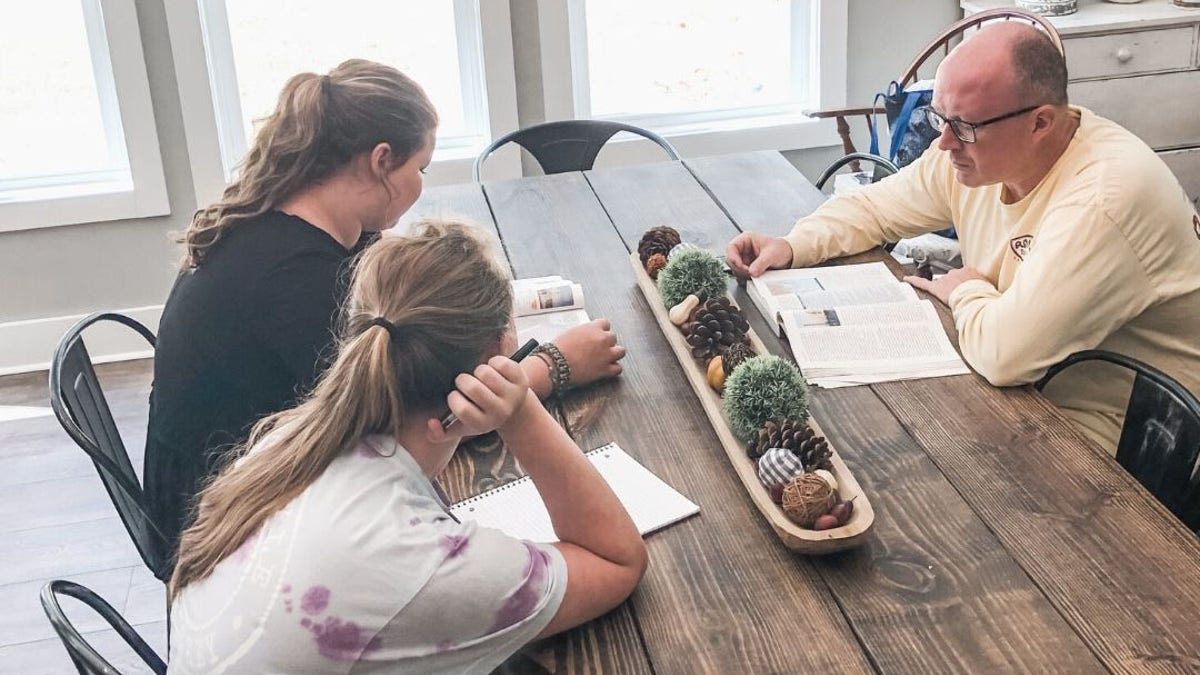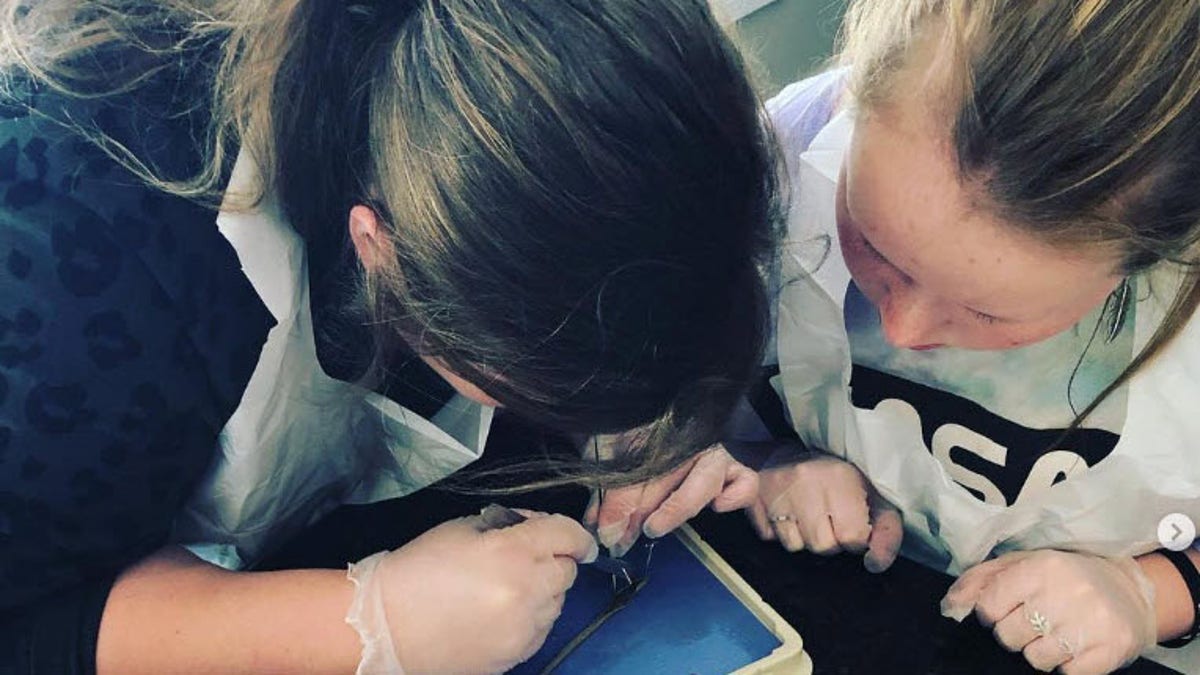Homeschooling seeing a rise in popularity across the country
Former teachers Robert Brown and Arlena Brown, and homeschool advocate Kerry McDonald join 'Fox & Friends Weekend' to discuss their experiences homeschooling their children
Some of America’s parents are still feeling the push to pull their kids from the traditional classroom.
Ever since the COVID-19 pandemic shook up education in America, concerns involving political bias in the classroom have triggered parents and guardians to educate their children at home.
Taking children out of the traditional classroom is a choice that not only involves the children and their parents, but also other siblings and friends. For parents considering homeschooling, here are helpful tips to get started.
Check out the tips noted below.

Alan Gaddy teaches his daughters a history lesson at the kitchen table. (Jamie Gaddy)
- Relax
- Check your state’s legal requirements
- Use available resources
- Be flexible
- Connect with a community
- Keep the kids engaged with other children
- Create a designated learning space for your child
- Establish a healthy routine
1. Relax
Deciding how your children are going to be educated is a huge decision for both your child and for you as parents.
"This isn’t something you take lightly," homeschool.com editor-in-chief and mother of six Jamie Gaddy of Georgia told Fox News Digital recently.
"I mean, this is your child’s education."
Gaddy, a former teacher, has homeschooled all six of her children. She stands strongly in favor of the unique education model this teaching provides, she said.
"It’s really exciting when you see a child absolutely turned on to learning and just loving it because that education matches them," Gaddy said.

A teacher with a group of preschool children. A child’s specific needs and interests can be addressed through homeschooling, said one Georgia mom. (iStock)
Homeschooling is a big commitment and decision, but it is important to remain relaxed during the process.
"Everybody has some anxiety about it, everybody has a few worries — but if you let that rule the day, it kind of robs all the joy out of it," Gaddy said.
The homeschooling expert advised parents to take a step back and look at their family, their kids and themselves in order to begin the process carefully.
Gaddy said homeschooling has brought the focus back to "family roots," which is what "makes our culture and our country great."
2. Check your state’s legal requirements
Each U.S. state has its own set of legal requirements for homeschooling.
HIGH SCHOOL STUDENTS HAVE A STRONG SHOT AT SUCCESS WITH CAREER TECHNICAL EDUCATION: ‘A WIN-WIN’
Gaddy advised parents to check their state’s guidelines before diving in, as some states can have "additional requirements."

The Gaddy family's second homeschooled graduate smiles in cap and gown as she shares graduation day with her grandparents. (Jamie Gaddy)
"None of them are outrageous, but some of them do take some planning and preparation and time to fulfill," she said.
"So, make sure you follow those."
Gaddy reminded parents that they will also be responsible for keeping records of their children’s grades, which can be kept digitally or in a notebook.
3. Use available resources
A wide variety of homeschooling resources are available.
Homeschooling supply companies exploded in 2022, according to Gaddy.
This includes companies such as Home Science Tools, which provides kits for projects such as experiments and dissections.
BACK-TO-SCHOOL BY THE NUMBERS: KEY STATS ABOUT STUDENTS, TEACHERS AND THE SCHOOL YEAR
For parents who are intimidated by higher-level curricula, Gaddy said checking online resources — where educators are available to teach a subject to students remotely — is a good idea.
"It takes the weight off your shoulders, yet you can sit there and listen and learn right alongside them," she said.

Two Gaddy children study independently at home with their dog, Beau. (Jamie Gaddy)
While parents aim to personalize their child’s education, Gaddy recommended websites such as homeschool.com, which provide helpful tools to make the job a bit easier.
For example, a child who is interested in technology might require a full online curriculum, she said, while a literacy-based curriculum would better suit a child who loves to read.
"Taking those steps and getting started on the right foot is so important," she said.
"If you just jump into any old curriculum, it may not be a good fit, and it can make you miserable."
4. Be flexible
It might take a few attempts to nail down the right curricula and educational set-ups for your family.
When it comes to bringing school into the home, Gaddy said it can be hard to separate — and juggle — work and play.
"We had to learn to flip our schedule. Maybe today we had to do errands and homeschool later," she said.
"Flexibility is really the key."

Two of the Gaddy kids are shown studying high school biology as they dissect an earthworm at home. (Jamie Gaddy)
5. Connect with a community
Parents should get connected with others in their communities to share thoughts and ideas, Gaddy recommended.
"We have a wonderful Facebook community where you can ask questions and a lot of other parents will jump in and share," she said.
"I encourage parents to get in with a local group and ask questions."
Such connections can provide support if and when any doubts about homeschooling begin to bubble up.
6. Keep the kids engaged with other children
One downside of homeschooling is that school isn’t a place to interact with other children, since learning is done at home. Social interaction with other children is important, so it's vital to get that social aspect incorporated into your child’s life in other ways.
CLICK HERE TO SIGN UP FOR OUR LIFESTYLE NEWSLETTER
Gaddy said the public is quick to assume that kids schooled at home are unsocialized. Yet the truth is, she said, that "homeschoolers are busy people."
"We try to take advantage of educational opportunities all over the place," Gaddy said.

For children who are homeschooled, it is extra important to make sure they are participating in activities outside the home. (Brownie Harris/Corbis via Getty Images)
"You've heard of museums having educational days and special events. Well, usually, you'll find homeschoolers there."
Take advantage of opportunities like this, where your child can both interact with others, and take learning outside the home classroom.
Gaddy said most homeschoolers would attest that they struggle to "actually stay home."
"Our children are usually involved in sports, in extracurricular activities, just like every other child," she said.
While some people might view homeschool education as "inferior," Gaddy mentioned that most homeschool students will wind up scoring 10% to 20% higher on SAT and ACT testing.
"College professors love the homeschooled students because they are diligent, they pay attention, they engage in class," she said. "They’re just into it."
7. Create a designated learning space for your child
When children are homeschooled, learning happens inside their household.
Because of this, especially for small children, it may be difficult to avoid distractions like toys and the TV.

The schoolroom inside the Gaddy home in Georgia. (Jamie Gaddy)
Create a space in your home where school is done that is separate from where the kids usually play or relax.
CLICK HERE TO GET THE FOX NEWS APP
It doesn’t have to be extravagant. A desk, chair and some fun decor will suffice. Make sure your child is only using this space when it is time for learning, so they know that when at the desk it’s time for school.
8. Establish a healthy routine
While flexibility is important to homeschooling, so is maintaining a routine. If there are days when the routine doesn’t go as planned, that’s OK. Be flexible and adjust. At the same time, if there is absolutely no routine both you and your child may experience stress.
Setting a routine is a healthy habit that your child can develop while homeschooling. It’s important to have a school start time, breaks throughout the day and an end time.
Although the schedule isn’t always going to be exact, not having one at all can leave little room for success.
For more Lifestyle articles, visit www.foxnews.com/lifestyle.











































